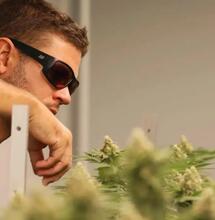The Potential of CBC

Scientists have identified about a hundred phytocannabinoids in cannabis. THC and CBD are the most abundant and most studied to date. But they are not the only ones with therapeutic properties.
Cannabichromene (CBC) is a non-psychoactive phytocannabinoid. Like THC and CBD, it is one of the primary cannabinoids derived from the acidic cannabinoid CBGA. CBC has specific therapeutic properties.
CBC is a cannabinoid with interesting medical properties. It is also a THC amplifier. It works in synergy with other cannabinoids and accentuates their effects, a phenomenon called the entourage effect. CBC has analgesic, anti-inflammatory, anti-fungal, and antibacterial properties. It could also treat depression symptoms. CBC promotes neurogenesis. It also has anticancer properties.
Cannabichromene was discovered in 1966 by Israeli researcher Raphael Mechoulam, who had already discovered THC in 1964. CBC is naturally present in cannabis in smaller quantities than THC and CBD like most other cannabinoids.
CBC is extracted from the cannabis plant using supercritical CO2. It is possible to buy CBC oil online. It is also possible to obtain CBD flowers on which CBC has been sprayed.
Neurogenesis
Neurogenesis refers to the process of neuron formation. Adults continue to produce neurons through adult neurogenesis. According to researchers, CBC promotes neurogenesis. Its properties could be interesting for treating neurodegenerative diseases such as Alzheimer's, Parkinson's, or Huntington's disease.
Anti-inflammatory properties
The anti-inflammatory properties of CBC are well documented. It enhances the anti-inflammatory effects of THC and CBD but has its effects when used alone, as shown in a 2010 study. Conversely, CBC’s anti-inflammatory powers are enhanced when consumed with THC.
In vitro and in vivo animal studies have been conducted that have suggested that CBC has anti-inflammatory properties that are beneficial for inflammatory bowel disease and inflammatory pain disorders such as rheumatoid arthritis.
Anticonvulsant properties
Recent studies have shown that homemade oils that contain CBC among other things are effective at lower doses than the drug Epidiolex, which contains only purified CBD, which is approved for the treatment of epilepsy.
Antibacterial and Antifungal
Several studies have investigated the use of cannabinoids as antibacterial and antifungal agents. Because drug resistance is increasing, new antimicrobial agents are needed.
Among the cannabinoids tested, CBC was one of the most effective. One study showed that CBC had similar antibacterial activity to the antibiotic streptomycin against Gram-positive bacteria.
CBC was also reported to be highly effective, second only to CBN (cannabinol), in reducing the growth of oral bacteria isolated from dental plaque.
Analgesic Properties
The cannabinoid CBC may also have analgesic effects. One study showed that CBC combined with THC had potent analgesic effects. Animal studies have shown that both CBD and CBC cannabinoids stimulate pain-relieving circuits. Even when used alone, CBD produces mild analgesic effects.
Antidepressant
A study looked at the potential of cannabichromene as an antidepressant. This study showed that CBC reduced depressive-like behaviours in mice at a commonly used dose (20 mg/kg).
More From Soft Secrets:
Minor Cannabinoids Look Promising
Medical cannabis and the immune system








